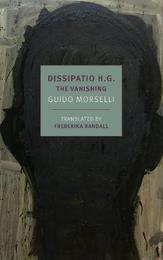
|
Dissipatio H.G.: The Vanishing
Paperback / softback
Main Details
| Title |
Dissipatio H.G.: The Vanishing
|
| Authors and Contributors |
By (author) Guido Morselli
|
|
By (author) Frederika Randall
|
| Physical Properties |
| Format:Paperback / softback | | Pages:168 | | Dimensions(mm): Height 203,Width 127 |
|
| Category/Genre | Modern and contemporary fiction (post c 1945) |
|---|
| ISBN/Barcode |
9781681374765
|
| Classifications | Dewey:853.914 |
|---|
| Audience | |
|---|
|
Publishing Details |
| Publisher |
The New York Review of Books, Inc
|
| Imprint |
The New York Review of Books, Inc
|
| Publication Date |
1 December 2020 |
| Publication Country |
United States
|
Description
A fantastic and philosophical vision of the apocalypse by one of the most striking Italian novelists of the twentieth century. From his solitary buen retiro in the mountains, the last man on earth drives to the capital Chrysopolis to see if anyone else has survived the Vanishing. But there's no one else, living or dead, in that city of "holy plutocracy," with its fifty-six banks and as many churches. He'd left the metropolis to escape his fellow humans and their striving, but to find that the entire human race has evaporated in an instant is more than he had bargained for. Guido Morselli's arresting post-apocalyptic novel, written just before he died, a suicide, in 1973, depicts a man much like the author himself--lonely, brilliant, difficult--and a world much like our own, mesmerized by money, speed, and machines. He travels around searching for signs of life at the US army base--palm trees, convertibles, and missile bays under the roadway--and scouts the well-appointed kitchens of his alpine valley's grand hotels for provisions, all the while brooding on the limits of human vision- his own, but also that of humankind. Meanwhile, life itself--the rest of nature--is just beginning to flourish now that human beings are gone. A precocious portrait of our Anthropocene world and a philosophical last will and testament from a great Italian outsider.
Author Biography
Guido Morselli (1912-1973) was a novelist and essayist. After serving in the Italian Army, he began writing reportages and short stories while living abroad. He wrote several works of fiction, including Past Conditional, Divertimento, and Roman senza papa ("Rome without a Pope") as well as four books of essays. NYRB Classics published his novel The Communist in 2017. Frederika Randall is a writer, reporter, and translator. Among her translations are Ippolito Nievo's Confessions of an Italian, and for NYRB, Guido Morselli's The Communist. She has received NEA and PEN/Heim translation grants, and with Sergio Luzzatto, the Cundill Prize. She lives in Rome.
Reviews"Given the narrator's-and Morselli's-views on contemporary society and its endless efforts to eliminate all kinds of earthly friction, one may even read this end of the world as a kind of collective wish fulfillment. One of the questions Morselli seems to have had on his mind is: How alive was everyone in the first place? . . . the echoes one finds in "Dissipatio H.G." of life during the coronavirus pandemic are, at times, so glaring that some passages read like thinly fictionalized versions of the present. Apocalyptic fiction is often disinterred amid catastrophes, either for their prescience or because they are paradoxically reassuring. Each phase of the quarantine seems represented in this slim novel . . . Morselli is drawn to anticlimaxes, resisting drama at every turn, and it is this instinct that makes his final book so resonant with certain experiences of the past year." -Alejandro Chacoff, The New Yorker "Just as Morselli, tragically overlooked in his lifetime, was destined to be hailed as one of contemporary Italy's most iconoclastic writers, so was this novel, his last, destined to be translated, at the end of her long and distinguished career, by Frederika Randall. I can think of few works of literature more appropriate for our acutely isolating and endangered times." -Jhumpa Lahiri "I recently had a chance to read a wonderful book, Dissipatio H.G., written by an Italian, Guido Morselli, who subsequently killed himself. I think it would make a highly interesting subject for a film, and you would certainly be the ideal director." -Letter from Marcello Mastroianni to Andrei Tarkovsky "This is a powerful, erudite meditation on existence and the terror of loneliness." -Publishers Weekly "Caustic, lonely and obsessive, the novel offers a richly speculative portrait of early Anthropocene resignation." -Dustin Illingworth, The New York Times "It has been oddly comforting these past few weeks to read a novel about living in total isolation after an inexplicable, catastrophic event causes the entirety of Earth's population-save for one very concerned narrator-to vanish... a useful reminder that things can always get worse . . . In essayistic digressions that voluptuously condemn the decadence of modern civilization . . . Morselli makes the case for himself as a cantankerous shared relation of Huysmans and Houellebecq." -Andrew Martin, Harper's Magazine "[Translator Frederika Randall had] a deep knowledge of Italian, and a keen ear for the rhythms and tones of English. . . . Dissipatio H.G. is, like many postapocalyptic stories, a philosophical novel, a work of social criticism, a corrective to our anthropocentrism. . . . Morselli's many images of the natural world in transition-ironic post-human pastorals-lose none of their haunting vividness in Randall's versions." -Geoffrey Brock, The New York Review of Books
|